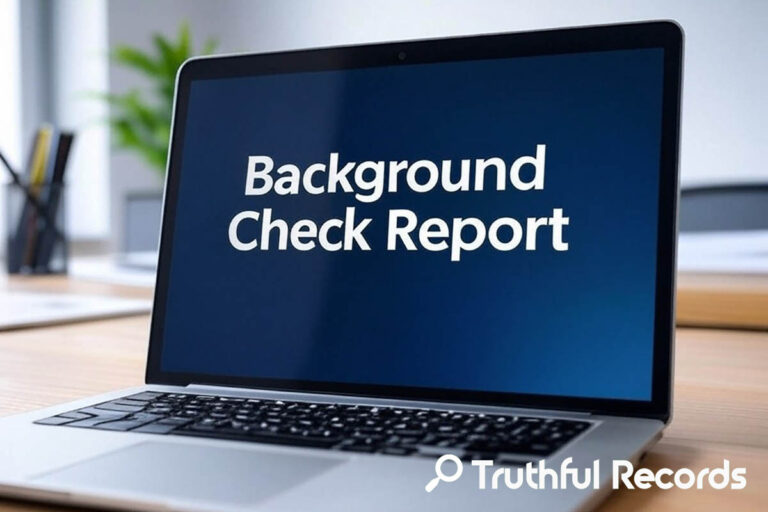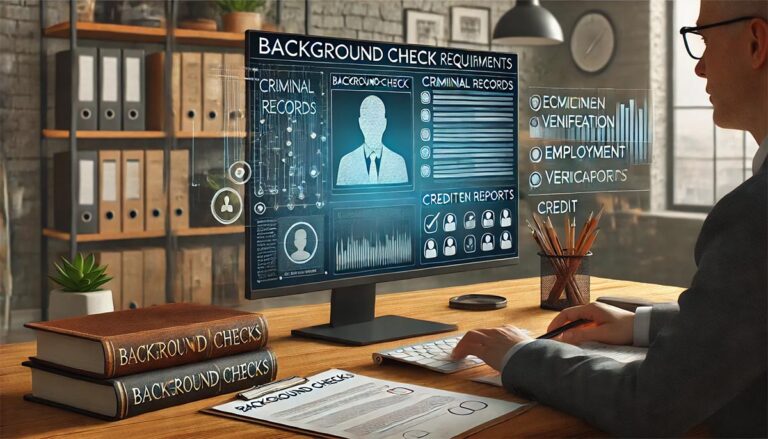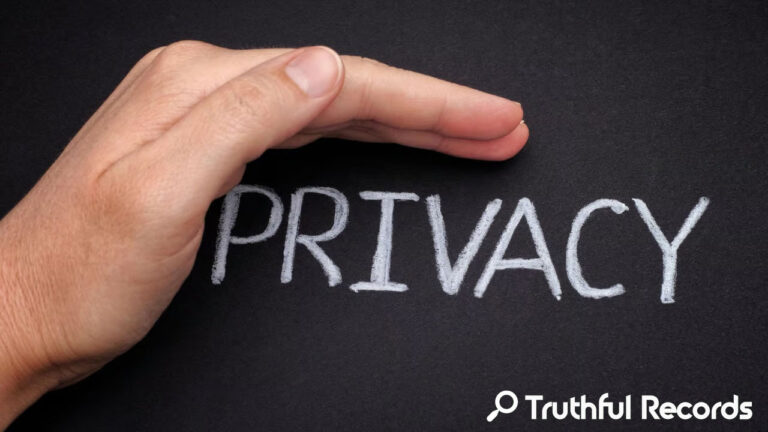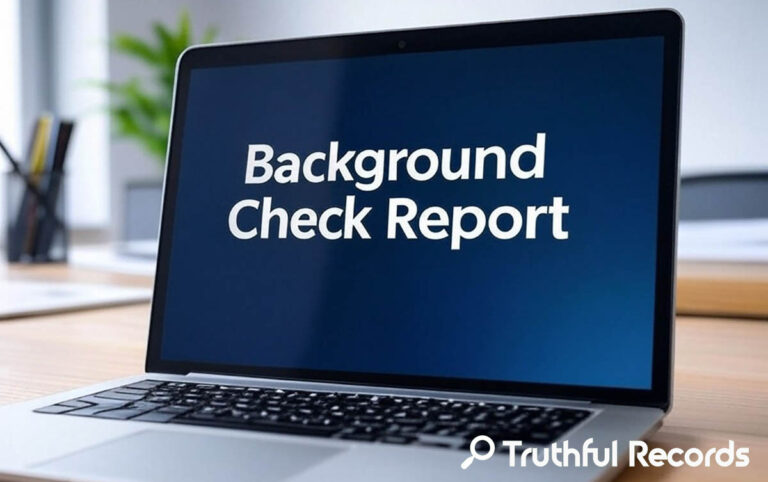Background Check Processing Time in 2025: What to Expect and How to Plan Ahead

Did you know some background checks can be done in just minutes, while others might take up to three weeks? In today’s fast-paced world, waiting for those results can feel like forever! I’ve seen job candidates lose opportunities and companies miss out on great hires because no one was prepared for how long background checks can take. Whether you’re an employer trying to fill a position quickly, a job seeker excited to get started, or a landlord checking tenants, understanding what affects background check times is really important. Check out this guide on personal background checks to learn about the factors that affect how long it takes and how to avoid delays. Let’s dive into what really matters for background check timelines in 2025!
Average Background Check Processing Times by Type
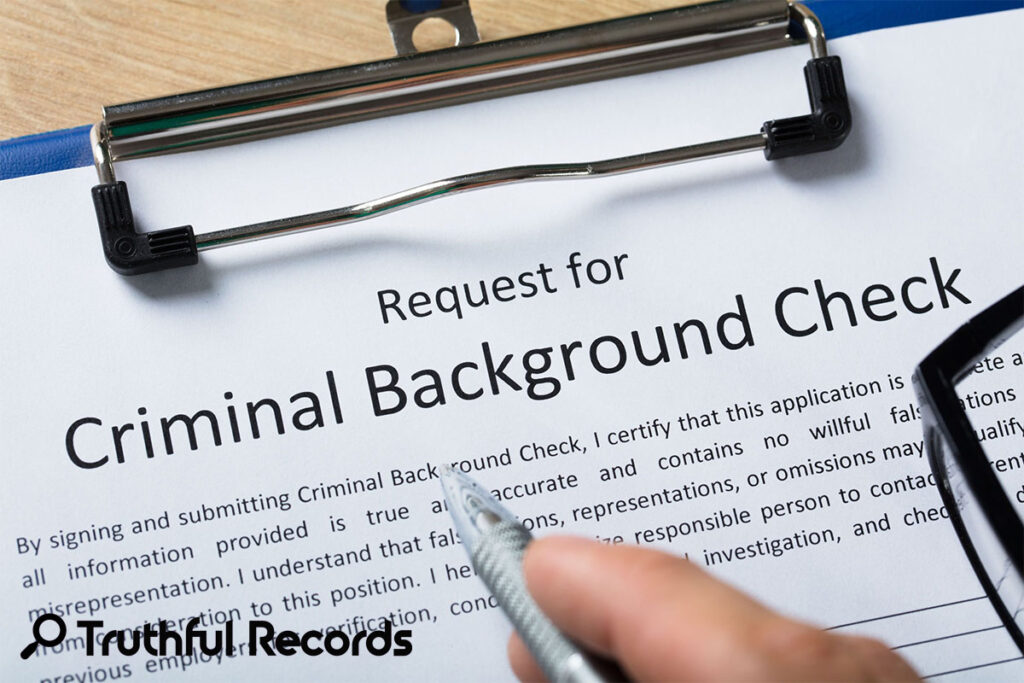
Basic Identity Check Timeframes
Basic identity checks, like confirming a person’s name, address, and date of birth, usually take the least time. These checks can often be done in 1 to 3 business days. It depends on how simple the request is and where the data comes from.
However, if there are any mistakes or extra details that need to be checked, the process might take a little longer.
Criminal Background Check Duration
Criminal background checks are common, but they can take a little longer. On average, they take about 3 to 7 business days, depending on where the search is done and how deep it goes.
For example, checking a local criminal record is usually faster than doing a nationwide search or checking multiple counties.
Employers should plan ahead because criminal checks can sometimes take longer, especially if extra verification is needed.
Employment Verification Processing Periods
Employment verification is another common part of background checks, but it can take some time. On average, it takes 3 to 5 business days, but this can change depending on how quickly the employer responds and how easy it is to find the records.
If the employer has easy access to records or replies quickly, it might be faster. However, delays can happen if past employers are hard to contact or if the verification involves multiple companies.
Education Verification Timeline Expectations
Education verification can take a few days, usually between 3 to 7 business days. How long it takes depends on how quickly the school responds and if the information provided is correct.
For example, checking degrees from big universities might be faster than verifying credentials from smaller schools.
It’s always smart for candidates to make sure their education details are accurate and up-to-date to avoid delays.
Factors Affecting Background Check Processing Times
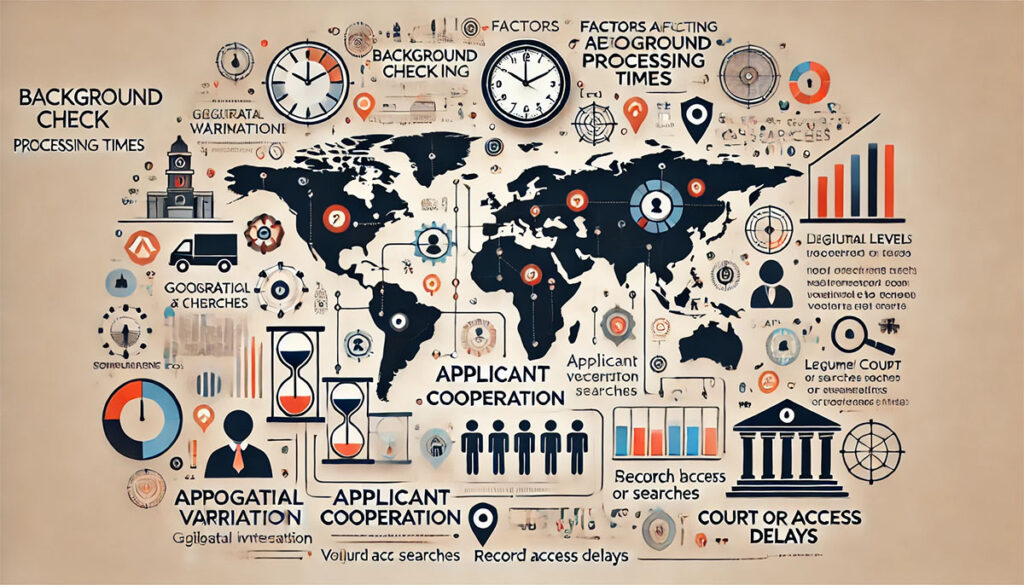
Geographic Variations in Record Access
One big factor that affects background check processing times is where the records are being checked. Different states, counties, and countries have different systems for storing records, which can make a big difference in how fast they can be pulled.
For example, cities with central databases might have faster processing times than rural areas where records are still on paper or spread out in different places.
International background checks can take even longer because it’s harder to get records from different countries.
Applicant Cooperation and Response Times
If an applicant responds quickly and gives the right information, like past employers or schools, the process can go smoothly.
But if the applicant doesn’t respond or provides incomplete details, it can cause delays. The screening company might have to spend extra time contacting the right people to verify the information.
Volume of Searches and Verification Points
If an employer needs to verify multiple things, like employment history, criminal records, and education, each extra step adds time.
During busy hiring seasons, when many employers are asking for background checks, the high number of requests can cause delays. This is especially true if the screening company is dealing with a lot of orders at once.
Court and Institution Processing Delays
If a background check involves court records or verifying academic credentials, delays can happen if the offices are short on staff, have a lot of backlogs, or are using outdated systems.
This is especially common with older records or smaller schools that don’t have digital access. Employers should remember that these delays are often beyond the control of the background check provider.
Industry-Specific Background Check Timelines
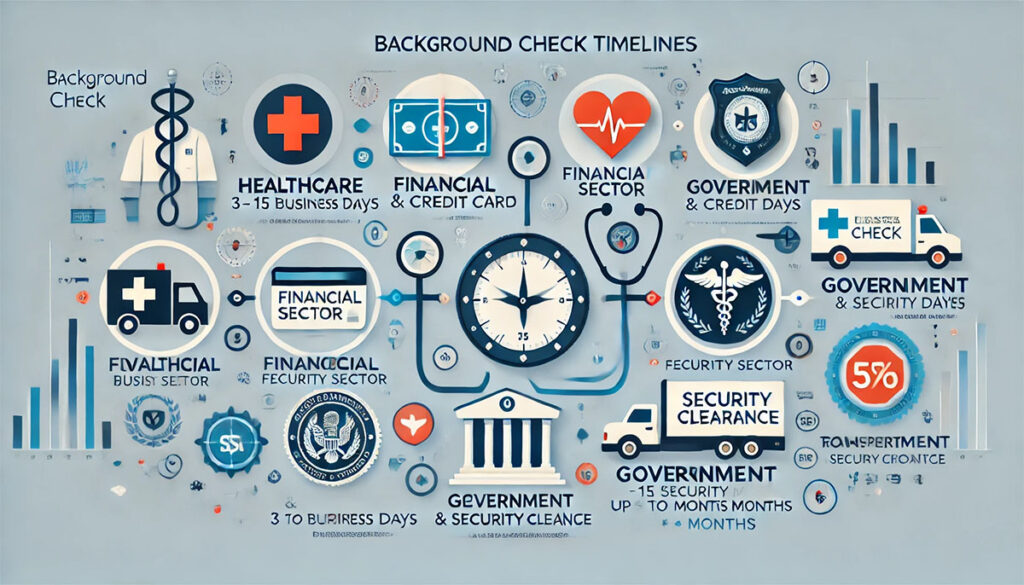
Healthcare Screening Requirements and Duration
Healthcare screenings usually take longer because the work is sensitive. These checks often involve verifying professional licenses, criminal records, and any history of malpractice or disciplinary actions.
On average, healthcare background checks take 5 to 10 business days, but the time can vary depending on how detailed the check needs to be and the specific requirements of the healthcare facility.
For positions that involve direct patient care, the process may take even longer due to extra checks for regulations and compliance.
Financial Sector Enhanced Verification Times
In the financial sector, background checks are more detailed because the work involves a lot of responsibility and needs to ensure financial security. These checks usually include criminal background checks, credit history checks, and verifying past financial jobs.
The process can take anywhere from 7 to 15 business days, depending on how deep the search goes and if there are any issues. Delays can happen when checking credit history, verifying financial certifications, or reaching out to previous employers for confirmation.
Government and Security Clearance Timeframes
For government jobs or positions needing security clearance, background checks can take much longer than in other industries. These checks look at criminal and employment history, but also dive into personal history, foreign contacts, financial stability, and potential national security risks.
Depending on the clearance level, this process can take anywhere from 1 to 6 months. The more sensitive the job, the more detailed the screening will be.
Transportation and Logistics Screening Periods
In transportation and logistics, background checks are important to make sure employees are reliable, especially for jobs with vehicles, heavy equipment, and safety-sensitive tasks. These checks usually include verifying driving records, criminal backgrounds, and drug screenings.
Typically, these checks take 3 to 7 business days, but delays can happen depending on where the driving records are from and how complex the drug tests are. For jobs that involve cross-border transportation, international checks may also be needed, which can take more time.
Common Causes of Background Check Delays
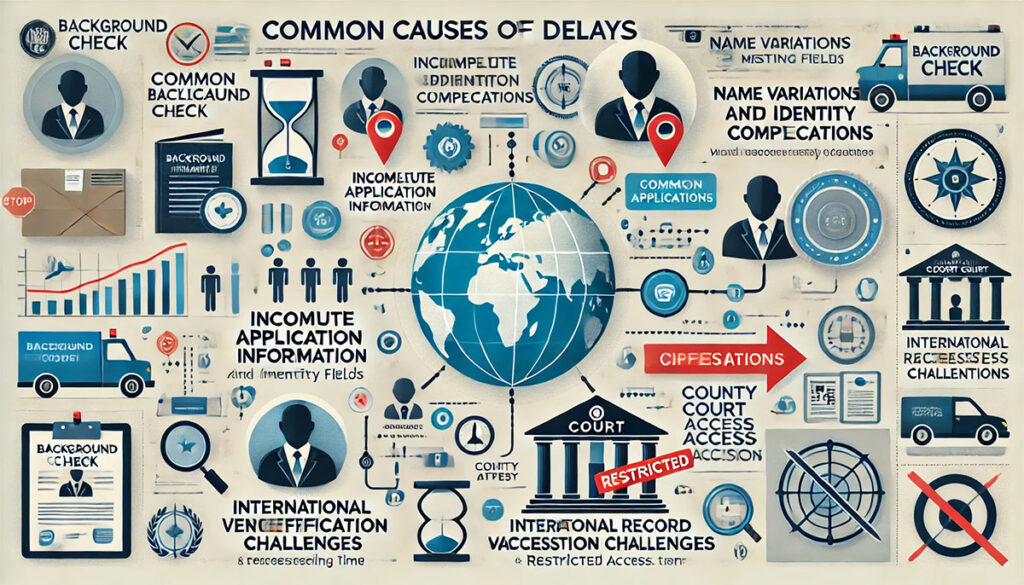
Incomplete Application Information
One of the most common reasons for background check delays is missing or incorrect information on the application. If an applicant forgets to include important details, like past employers, addresses, or job dates, it can slow down the process.
Screening companies will need to find the missing information, which can delay everything. To get quicker results, applicants should make sure their application is complete and up-to-date with accurate contact details and job history.
Name Variations and Identity Complications
Another issue that can cause delays is if an applicant has used different names, like a maiden name, nickname, or variations in spelling. This can make it harder to find criminal or employment records.
Additional steps may be needed to verify the correct name and communicate with the applicant to clear things up. Sometimes, extra time is required to check records under different name variations, which can slow down the process.
International Record Verification Challenges
When an applicant has worked, lived, or studied in other countries, verifying international records can be tricky. Each country has its own way of keeping records, and some have strict privacy laws or may not share information quickly.
This can add a lot of time to the background check process, especially if multiple countries are involved. Employers should expect possible delays when doing international checks, and applicants should make sure they provide all their international history to help speed things up.
County Court Access Limitations
County court access limitations can also cause delays. In some places, local systems are outdated, or records are only available on paper, which means they need to be retrieved manually.
If a background check involves multiple counties or a place with restricted access, it can take longer. Employers should know that county court delays happen often, and applicants might need to be patient when local records are part of the check.
Expedited Background Check Options
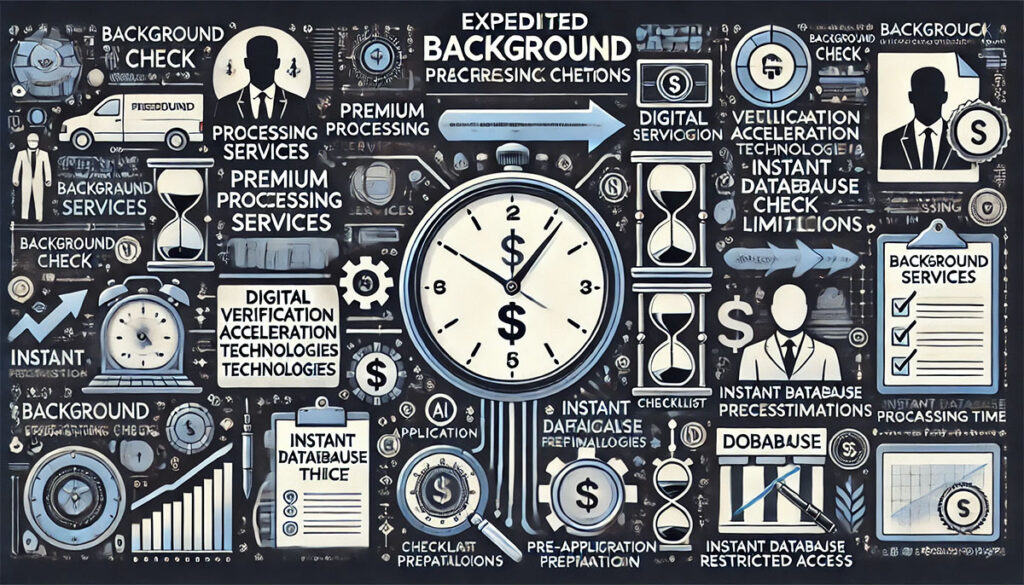
Premium Processing Services and Costs
For employers who need background checks done quickly, premium processing services can help speed things up. These services often prioritize your request and may use extra staff or resources to get things done faster.
However, this faster service comes at a higher cost. Premium services are usually more expensive than standard processing, and the price can vary based on how complex the check is and how urgent it is. While it’s a good option for urgent hires, employers should think about whether the cost is worth the faster results.
Digital Verification Acceleration Technologies
In today’s fast-paced world, digital verification technologies are speeding up the background check process. These tools make data collection and verification faster by automating tasks that used to require manual work.
For example, some services use AI to instantly scan and verify documents, or connect with digital databases for quicker access to information. While these technologies can greatly reduce processing times, it’s important that they’re accurate. They should always be used with careful verification to avoid mistakes.
Pre-Application Preparation Strategies
One way to speed up the background check process is by preparing before applying. Candidates can help move things along by making sure their information is up-to-date and complete. This includes double-checking things like employment history, addresses, and any necessary documents.
Applicants should also be ready to quickly respond to requests for more information or clarification. By being proactive and organized, candidates can cut down on delays caused by back-and-forth communication.
Instant Database Check Limitations
Instant database checks can give quick results for things like criminal records, credit history, and some types of employment verifications. However, these checks have their limits. They may not include the most up-to-date information or cover all areas, and they can’t replace more detailed checks like county court records or verifying international experience.
Employers should keep these limits in mind and use instant database checks as an extra tool, not as a replacement for more thorough screening.
Legal Compliance and Processing Time Impact
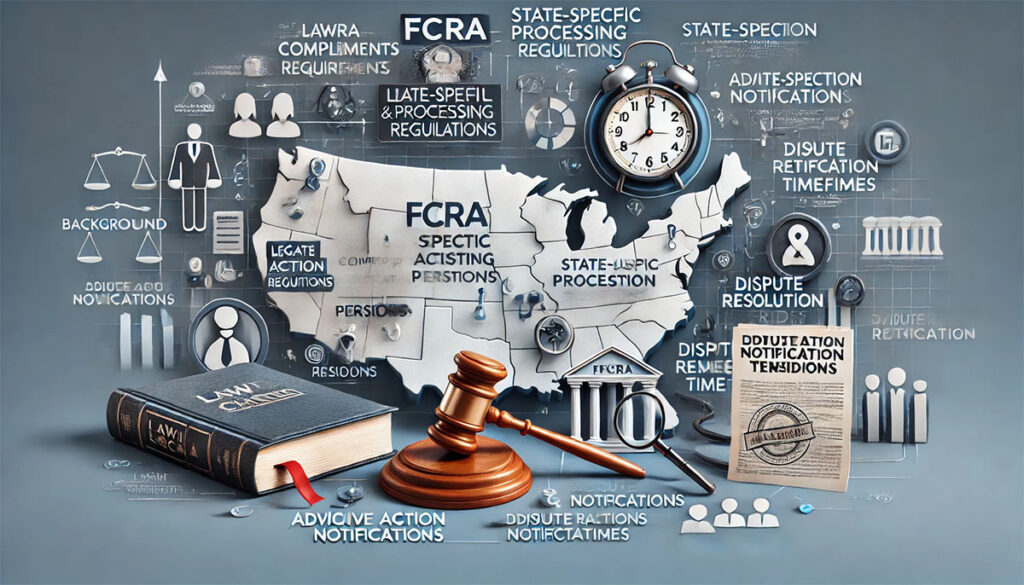
FCRA Requirements Affecting Timelines
The Fair Credit Reporting Act (FCRA) is an important law that regulates how background checks are done in the U.S. One of its key rules is that employers must tell candidates if they plan to make a decision based on the background check results.
This step adds some time to the process. Employers have to give the candidate a copy of the report and a notice of their rights before making any decisions. This can delay the hiring process by a few days, as the candidate has time to review the report and respond.
State-Specific Processing Regulations
Along with federal laws, different states have their own rules that affect background checks. Some states have stricter laws about what information can be used, while others limit when criminal records can be looked at.
For example, in states like California, employers can’t ask about criminal history until after an initial job offer is made. These state rules can sometimes slow down the process, as background check companies need to make sure they follow local laws, which might require extra steps or checks.
Adverse Action Notification Periods
When an employer decides not to hire a candidate based on a background check, federal law requires that they give the candidate time to review and challenge the results. This is called adverse action notification and involves two steps: first, a notice saying the employer plans to take action, and then a final notice once the decision is made.
This process can add several days to the timeline, depending on how quickly the employer moves through each step and whether the candidate disputes the findings.
Dispute Resolution Timeframes
If a candidate disputes the results of a background check, more time may be needed to resolve the issue. The candidate has the right to challenge any incorrect or missing information in their report. The background screening company must investigate the dispute, which can take up to 30 days.
During this time, the candidate can provide documents to support their claims, which can extend the process even more. Employers should be ready for possible delays as they wait for the investigation results before making a final hiring decision.
Technology’s Impact on Processing Times in 2025
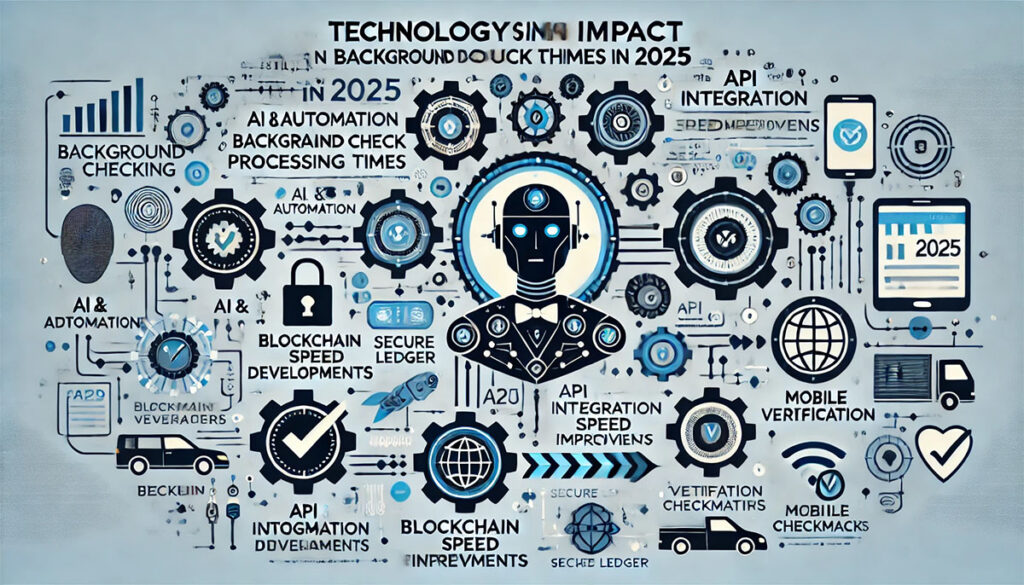
AI and Automation Advancements
In 2025, AI and automation will greatly speed up background check processing. AI tools can analyze data much faster than humans, quickly scanning criminal records, employment histories, and other important information with high accuracy. Automation can handle tasks like data entry and document verification, which speeds up the process even more. These advancements will help reduce the time it takes to complete a background check, allowing employers to make quicker, data-driven decisions.
Blockchain Verification Developments
Blockchain technology is making a big impact in many industries, including background screening. With blockchain, verifying a candidate’s information can become more secure and efficient. By storing verified data in a decentralized, tamper-proof ledger, background check providers can quickly access accurate and reliable records. This helps eliminate delays caused by data mistakes or inconsistencies. In 2025, if blockchain becomes more common for background checks, it could greatly improve both the speed and accuracy of verifications.
API Integration Speed Improvements
API (Application Programming Interface) integration is changing the game for background check speed. APIs allow background screening companies to quickly connect to external databases and services, pulling in verified data almost instantly. Whether it’s criminal records, educational histories, or other important details, API integrations can cut down the time needed to gather data. In 2025, we can expect even faster and more reliable background checks as API speed and features improve.
Mobile Verification Capabilities
Mobile verification is becoming more common in background checks. With more people using mobile devices, candidates can now submit documents, confirm details, and verify their identities directly through mobile apps. This speeds up the process and lets candidates take part in the verification on their own terms. In 2025, mobile verification technology is expected to get even better, making background checks faster and easier to complete entirely on mobile devices.
Planning for Background Check Processing Times
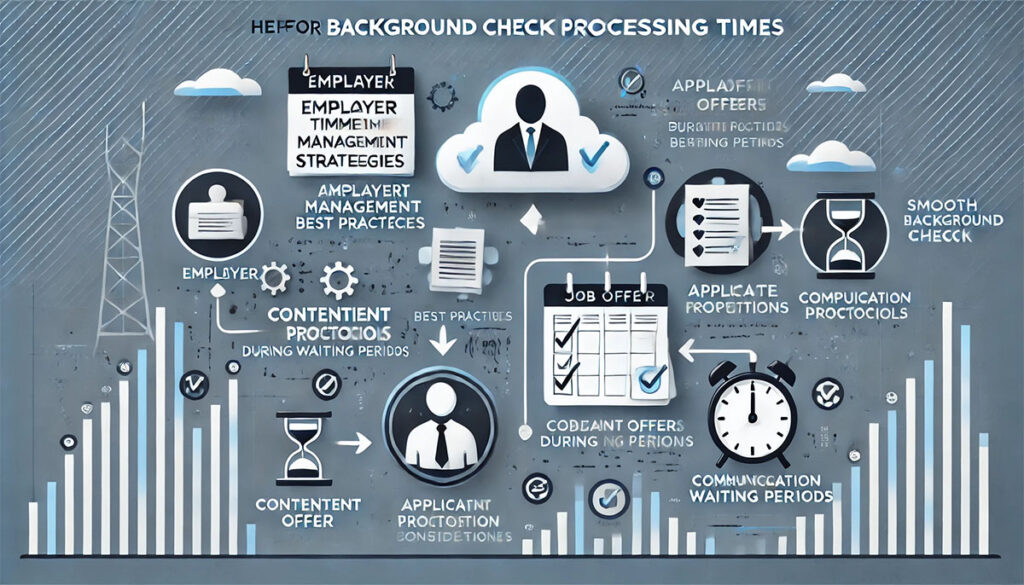
Employer Timeline Management Strategies
To avoid delays in the hiring process, employers need to plan ahead when managing background check timelines. One smart strategy is to start the background check as soon as the candidate is selected, instead of waiting until the final stages.
Employers should also set realistic expectations by considering processing times and potential issues. While using premium services or automation tools can speed things up, it’s important to have backup plans in case delays happen. Taking a proactive approach to managing timelines helps keep the hiring process running smoothly.
Applicant Preparation Best Practices
Applicants can help speed up the background check process by being well-prepared. They should make sure all the information on their application is accurate and complete, including their work history, addresses, and contact details for past employers or schools. They should also respond quickly if asked for more documents or details. By staying proactive, applicants can reduce delays and make sure their background check moves forward smoothly.
Contingent Offer Considerations
In many cases, employers make a job offer that depends on the successful completion of a background check. This helps keep the hiring process moving while the check is still being done. Employers should make it clear to candidates that the offer is conditional on the results of the background check. It’s also helpful to set a timeline for when the check will be completed, so the candidate knows when to expect a final decision. However, employers should be ready to rethink the offer if any problems come up during the background check.
Communication Protocols During Waiting Periods
Good communication is important while waiting for background checks to be completed. Employers should keep candidates updated on where they are in the process and let them know if there are any delays. Giving a clear timeline for when the check will be done helps manage expectations and shows professionalism. If any issues come up, employers should contact candidates quickly to address any concerns. Being transparent helps keep the candidate experience positive and reduces frustration during the wait.
Conclusion
Understanding background check processing times is important for smooth hiring, leasing, and business operations. While simple checks may be completed in 1-3 days, more detailed screenings can take 1-2 weeks, depending on their complexity and other factors. By preparing applicants, choosing the right verification provider, and using proactive strategies, businesses can reduce delays while keeping their screening thorough. It’s important to remember that faster isn’t always better—accuracy and compliance should always come first. With good planning and clear expectations, background check processing times can be managed effectively to meet your hiring or screening goals.

